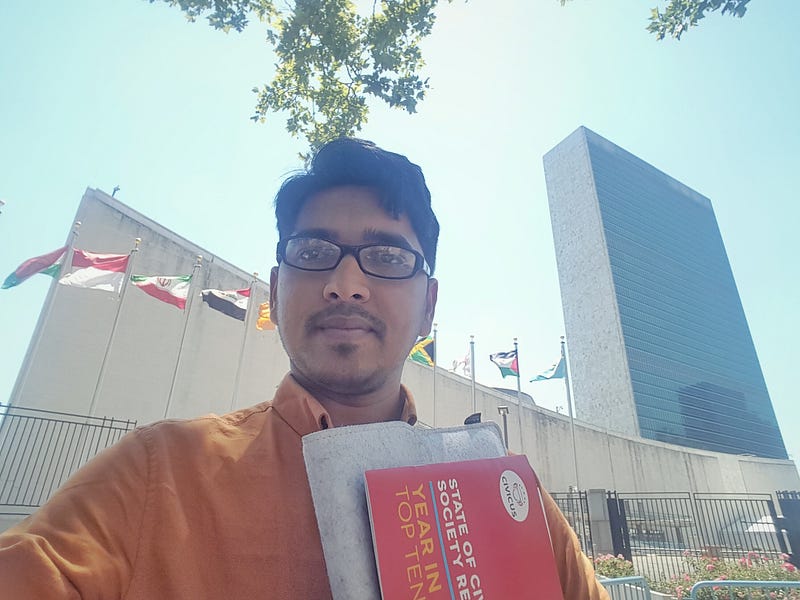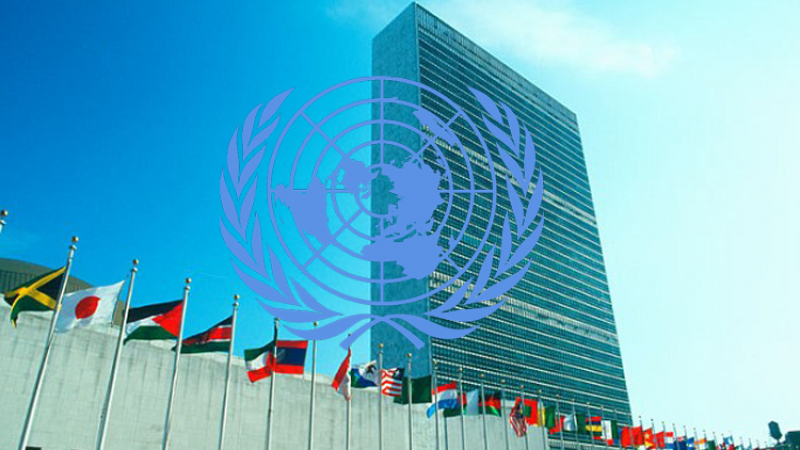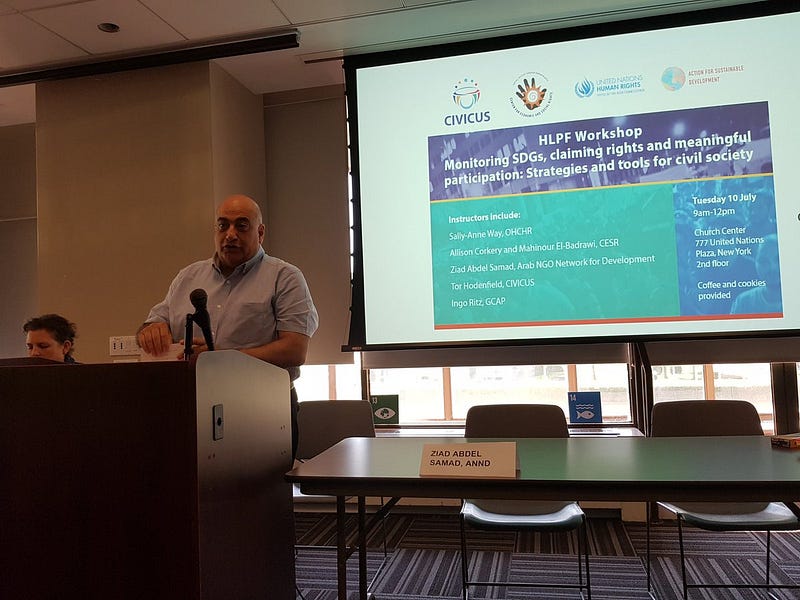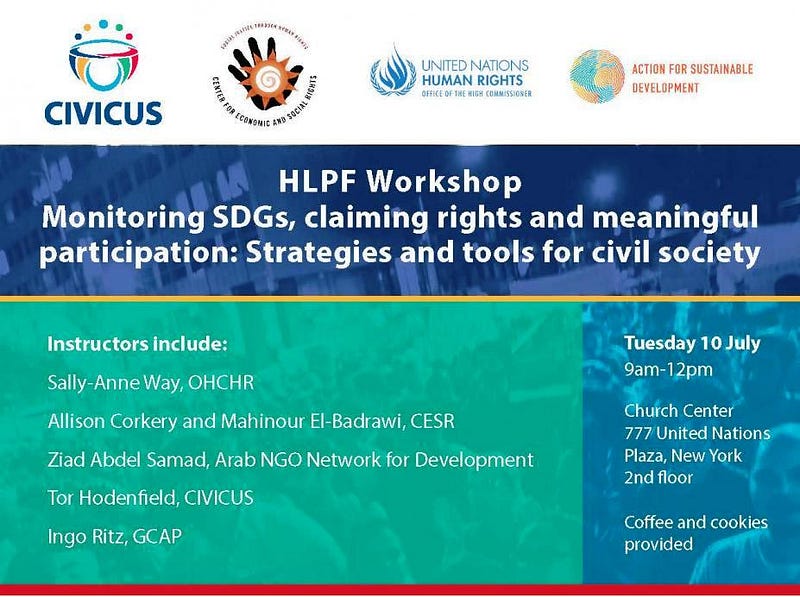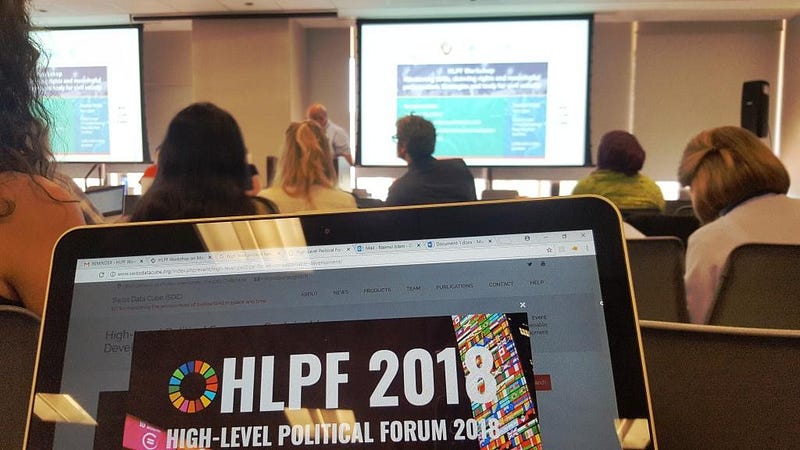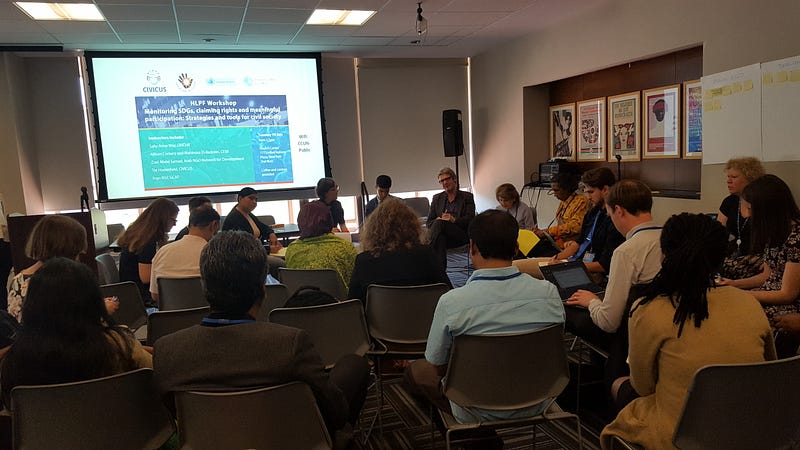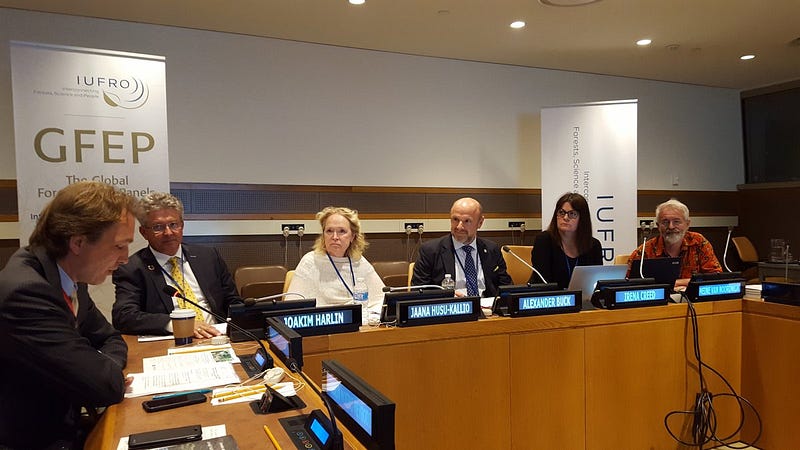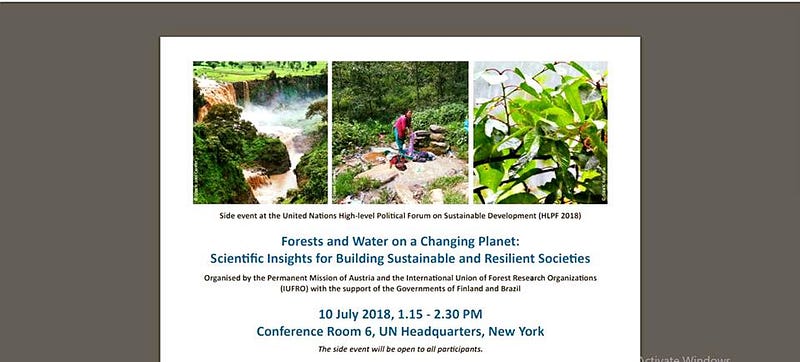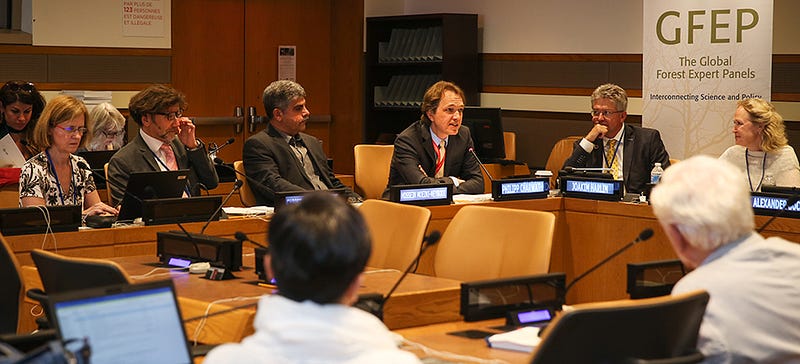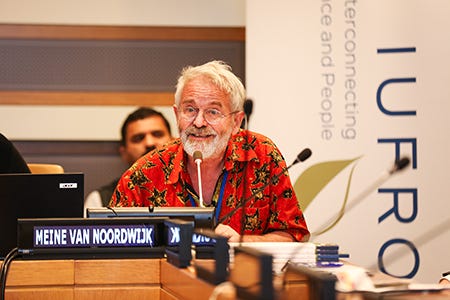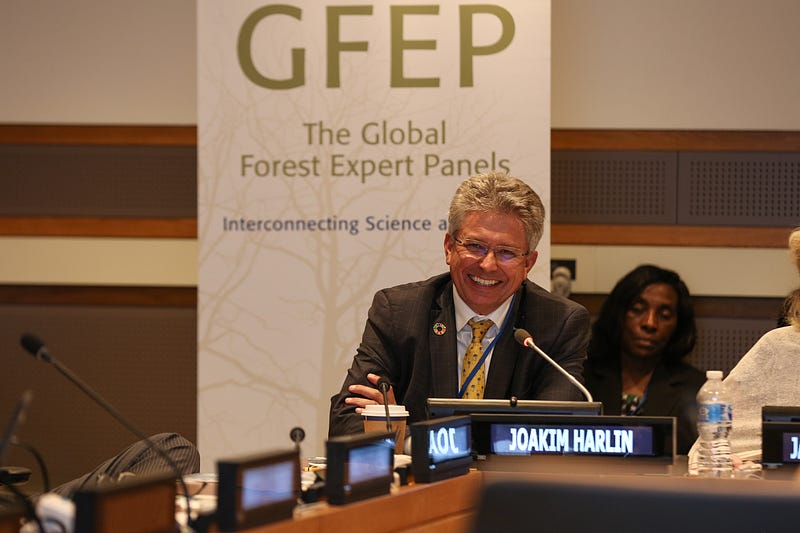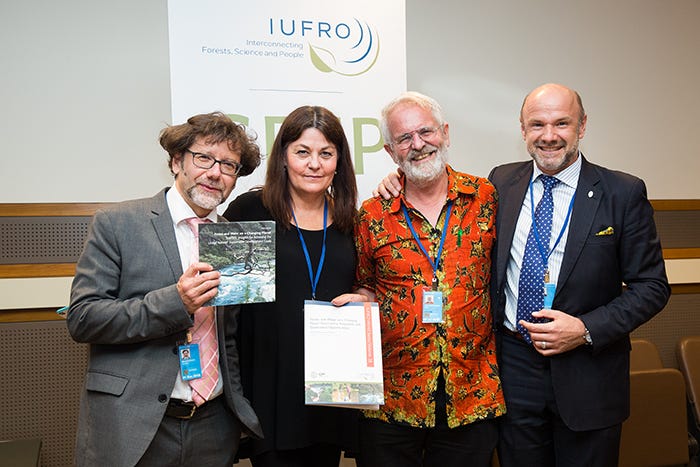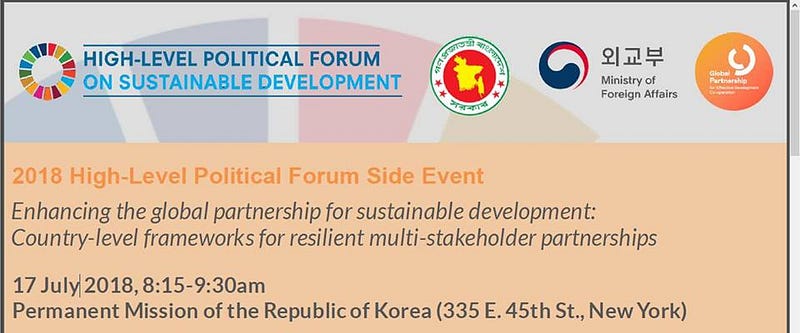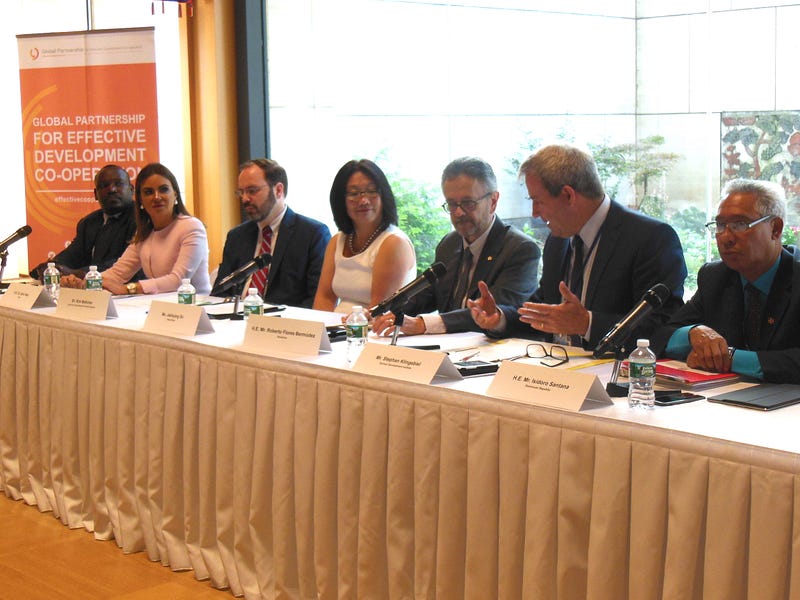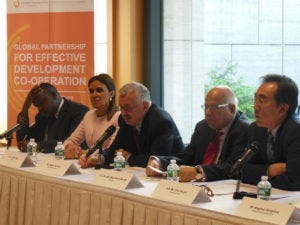Naimul Islam, from Bangladesh, is a young delegate has attended at the High level Political Forum (HLPF) of UN in New York last June.
He is a member of Bangladesh Model Youth Parliament and European M.Sc in Marine Environment and Resources, Spain with Erasmus Mundus Scholarship.
In HLPF, he urged to ensure integrity between the government and the civil society through meaningful Youth Participation towards achieving Sustainable Development Goals (SDGs).
It was Tuesday July 10 in the calendar page, from the morning different feeling was working in my mind. Imagine, Flags of every country flying around a high-rise building and fluttering in front of it. How lovely it is! From an early age, I saw the scene on television. Yes, I was talking about the United Nations Headquarters in New York. A long-cherished dream was fulfilled through participating the United Nations High Level Political Forum (HLPF) 2018.
The HLPF is the UN’s main platform for sustainable development. In the year 2012, the UN High-level Political Forum (HLPF) was constituted to review the sustainable development progress. The HLPF plays a central role in the global development and post-policy for sustainable development agenda 2030.
This 8 days long program was represented by the participation of various government and non-governmental organisations in the world.
It was my great opportunity to represent Bangladeshi young community through the Bangladesh Model Youth Parliament. The organisation is continuing various activities to bring the voice of young people of Bangladesh to the policy level. Also working at the international level, keeping in touch with local and international organisations to achieve sustainable development goals.
Let’s say about the first day. I was already staying in New York. Sohanur Rahman, Chief Executive of Bangladesh Model Youth Parliament, suddenly informed me that, I was nominated to represent the young people of Bangladesh in the High- Level Political Forum at UN Headquarters. I was thrilled to hear the news.
The previous night, I got the desired Ground Pass to enter the headquarters. In the morning when I was entering the United Nations building with all the security gates, I felt like I was Bangladesh!
There were several events on July 10th. World Alliance for Citizen Participation -Civicas, Action for Sustainable Development (A4SD) / Global Call to Action against Poverty (GCAP), organized workshops with UN Human Rights High Commissioner’s Office on Monitoring SDGs, claiming rights and meaningful participation: Strategies and tools for civil society. The venue was in the church centre of UN.
The representative of the UN Human Rights High Commissioner, Sally-Anne did the Opening and Moderation. This workshop highlighted capacity-building, knowledge development and networking, which allowed members of civil society from different countries to share their strategies, tools and experiences, and learn from each other on the best ways to engage in SDG implementation, monitoring and review at the national, regional and international levels.
I have discussed about Bangladesh contribution to ensure human right and Rohingya issue. Although we have challenged the implementation of safe water supply and sewerage system in Rohingya camps, Honourable Prime Minister Sheikh Hasina has provided humanitarian shelter to the oppressed refugees Rohingya.
I also expressed my view on how to ensure integrity between the government and the civil society through meaningful participation of young peoples.
After the event, I met the visiting dignitaries from different countries discussed on various issues.
After the lunch, from 1:30 pm to pm, one side event about effect of climate change on forests, water and aquatic resources was held at the conference of the United Nations Headquarters.
The event titled, ‘Forests and Water on a Changing Planet: Scientific Insights for Building Sustainable and Resilient Societies,’ launched the Global Forest Expert Panel assessment report, ‘Forest and Water on a Changing Planet: Vulnerability, Adaptation and Governance Opportunities,’ which addresses, among other things, the climate-forest-water-people nexus.
It organised by the permanent mission of the Austria in the United Nations, the International Forest Research Union and the official representative of Brazil and Finland.
As a student of Marine Biology and working as Climate Activist, I took an active interest in this event. Speakers highlighted links between SDG 6 and SDG 15, including through SDG 6 target 6.6 (protect and restore water-related ecosystems). There were detailed discussions on how to create an adaptive society to face climate change induced impact on forests and water.
Approximately 75% of the world’s water supply comes from forested watersheds.
During the event, speakers highlighted that: approximately 75% of the world’s water supply comes from forested watersheds; forest ecosystems have strong inter-linkages with the SDGs; and a stronger forest-water link can help policymakers make sound decisions.
Austrian permanent representative Philip Charlath, United Nations Senior Forest Policy Officer, delivered the welcome speech. Along with other issues, experts also discussed about Goal 14 of SDGs; Conserve and sustainability use the oceans, seas and marine resources for sustainable development.
GFEP Co-Chair Meine van Noordwijk, World Agroforestry Centre (ICRAF) and Wageningen University, said forests play a role in modifying rainfall and climate in a manner not captured under the UNFCCC. GFEP Co-Chair Irena Creed, University of Saskatchewan, stressed the need for new institutional and governance frameworks to optimize climate-forest-water management.
Joakim Harlin, UN Environment Programme (UNEP, or UN Environment) and UN-Water Vice-Chair, noted links between SDG 6 (clean water and sanitation) and SDG 15, including through SDG 6 target 6.6 (protect and restore water-related ecosystems). One participant suggested developing a synthesis report on SDG 6 and SDG 15 for the next HLPF.
Jaana Husu-Kallio, Permanent Secretary, Ministry of Agriculture and Forestry, Finland, emphasised the need to move from silo-type thinking, saying the biggest challenge is to reorganise and think from the nexus point of view. He said Finland’s development policy “One world, common future” takes forests and water into account.
During the ensuing discussion, topics included: lack of reference to water during HLPF interventions on SDG15; the need for a multi-sectoral and multi-disciplinary approach; inadequate training in hydrology in many countries; engagement of the private sector; the role of food security; and the possibility of developing a synthesis report that combines SDG6 and SDG15 for the next HLPF to provide informed policy advice.
In this 8 -days long program, 6 SDGs were reviewed, 8 special events, 25 subject- matter meetings, 260 side events, 33 exhibitions and various events were organised with 2200 registered participants.
Several side events also organized from the Bangladesh side. Governments of Bangladesh and Republic of Korea was hosted one side event “Enhancing the global partnership for sustainable development: Country-level frameworks for resilient multi-stakeholder partnerships” on 17 July 2018 in the margins of the High-Level Political Forum on Sustainable Development (HLPF) at the Permanent Mission of the Republic of Korea to the United Nations in New York.
The side event provided a platform for open dialogue around the key opportunities and challenges for building more inclusive institutional frameworks and evidence-based discussions on on ways to strengthen country-level partnerships between a wide variety of development stakeholders.
Bangladesh’s Minister of Finance, H.E. Mr. Abul Maal Abdul Muhith was the keynote speaker in a meeting held at Millennium Hilton Hotel in the United Nations Headquarters. He told the success story of Bangladesh how the country turned around in today’s position from LDC. He recognised that to leave no one behind and meet global promises by 2030, we need to effectively engage all relevant stakeholders in development policy- making, planning and implementation, much like Bangladesh’s own local consultative processes and spaces for open dialogue and coordinated policies.
The side event generated evidence-based dialogue, with a wide array of panelists presenting including Ministers from the Dominican Republic and Egypt, representatives from the government of Honduras, civil society (CSO Partnership for Development Effectiveness), private sector (Center for International Private Enterprise), and multi-lateral institutions (World Bank). The discussions led an honest debate around how country-level, multi-stakeholder partnerships can help implement the SDGs and how they might be reflected in VNRs.
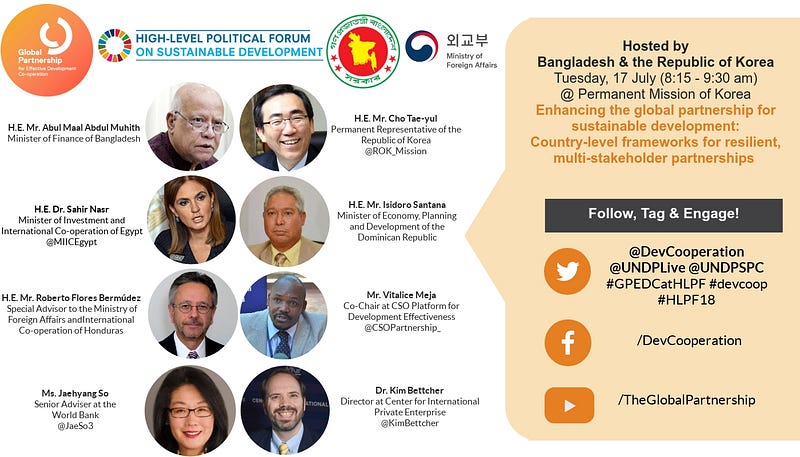
Discussion centred around the importance of establishing multi-stakeholder institutional frameworks for sustainable development at the country level, and the ways in which partnerships could be strengthened and expanded in order to increase development effectiveness and contribute to achievement of the 2030 Agenda.
At this discussion, Bangladesh’s permanent representative and ambassador to the United Nations, Masud Bin Momen and other diplomats were present.
The event attracted over 100 participants from governments, international organisations, civil society, private sector and academia, among others to discuss good practices and progress on institutionalising multi-stakeholder frameworks at the country level to increase the effectiveness of co-operation and support achievement of the Sustainable Development Goals (SDGs)..
Due to the busyness, I was not available directly to the following programs but had not missed-out on the opportunity to provide feedback from virtually present. High-level Political Forum was something special for me. A great deal of experience at international level, representing own country, expressing views, getting acquainted with new people etc made my days.
The dream of experiencing the United Nations was came true by direct collaboration of Bangladesh Model Youth Parliament. The experience gained by representing the youth of the country in the United Nations is a great achievement. It was matter of great pride that in every session to highlight Bangladesh in front of the whole world and highlight the possibilities of young people of my country.
Significant part of the total manpower of Bangladesh is young, between 15 and 30 years of age. There is a lot of investment required to make this young community as resources. Through this, the youth will have to be created as entrepreneurs.
In the future, I want to work with these youth resources, together we can build a self-reliant prosperous Bangladesh.
